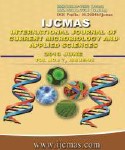


 National Academy of Agricultural Sciences (NAAS)
National Academy of Agricultural Sciences (NAAS)

|
PRINT ISSN : 2319-7692
Online ISSN : 2319-7706 Issues : 12 per year Publisher : Excellent Publishers Email : editorijcmas@gmail.com / submit@ijcmas.com Editor-in-chief: Dr.M.Prakash Index Copernicus ICV 2018: 95.39 NAAS RATING 2020: 5.38 |
Brinjal (Solanum melongena L.) can be grown best under tropical and subtropical conditions of our country. It is of great importance because its fruits have medicinal value. As it is a warm season crop, factors like high temperature, excessive soil humidity, excessive salinity, water stress adversely affect the crop growth and yield. Mulching improved these factors essential for proper growth and increases the production. Some of the major advantages of using mulch in brinjal is weed control, earliness in yield, and also reduce disease and insect problems which affect the yield to larger extent. Both organic and inorganic mulches are improves soil properties, which directly showed the positive response on yield and yield contributing traits. Inorganic mulches like black plastic mulch is found beneficial in brinjal over organic mulches, whereas in summer brinjal organic mulch like rice straw mulch showed extremely best result with respect to soil water conservation capacity, vegetative growth and yield. On the other hand, nutrient aspects of soil also improved by using organic mulch as compared to inorganic mulch like coridia leaves provides high amount of N and K to the soil. Whereas variable concentrations micronutrients with high amount of P found in case of black polyethylene film. Reflective mulch showed considerable effect to repel aphid population. Ascorida leaves, rice straw mulch, black polyethylene mulch and reflective mulch found effective in Brinjal so, these mulches can be also recommended to farmers for improving the different aspects related to the yield traits for increasing the productivity and improve soil health without harming the soil macro and micro flora, fauna.
 |
 |
 |
 |
 |